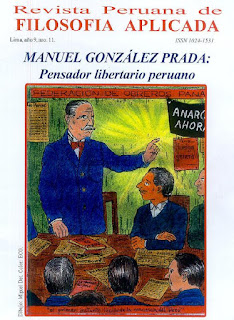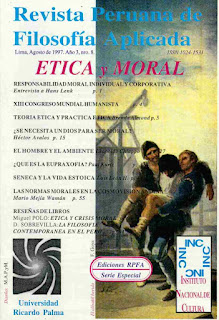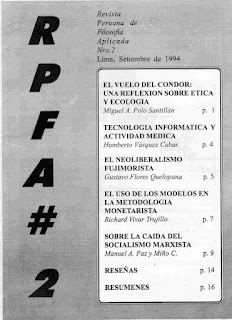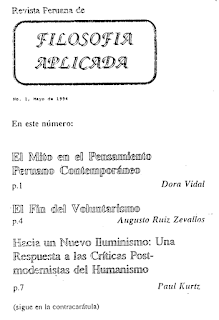ABSTRACTS
PHILOSOPHY, TO PHILOSOPHIZE AND PHILOSOPHER IN THE THOUGHT OF JOSÉ CARLOS MARIATEGUI:
J. Octavio Obando Morán, Department of Philosophy, San Marcos National Major University.
It is about the position of J.C. Mariátegui in front of Philosophy in the Imperialist Age, i.e.the Bourgeois Philosophy without a dogma, understanding dogma like "a doctrine of a historic change." The Imperialist Age is confronted by Marxism that like philosophic speculation takes from capitalist thinking, all that makes to the latter hesitant before its extreme consequences, and so capitalist thinking gives up to go on, retreats, and refuses to continue its work. This paper is also about the role of philosophy: "The philosophy recovers its classical function of universal science, that dominates here and contains all sciences" and that the "Latin American thinking is not generally but a compound rhapsody with motives and elements of the European thinking." Finally we speak of the place of Philosophy in the economical political order.
THE HUMANISM OF MARIÁTEGUI:
José Mendívil, Institute of Science and Technology, Ricardo Palma Peruvian University.
In the year 1930, after an agony of death, José Carlos Mariátegui dies in the Villarán Clinic. He believed, like other socialists of his time, that capitalism had left to coincide with progress, and that this passed to rely on socialism. Contrarily to which he had waited for, his thought doesn't any longer influence in the national life and is the corner where rest the intellectual disillusioned of their leisure, like those ones he strongly judged and insulted. To difference of the Humanism of Marx, that one of Mariátegui is the Humanism of the artist, of the adventurer, of the believer and the brave performer of the heroics myths of the crowds that advances the work of the heaven in earth.
VALIDITY OF MARIÁTEGUI MARXIST THINKING IN THE XXIth CENTURY:
Harry E. Vanden, Department of Government and International Affairs, University of South Florida.
This article argues that José Carlos Mariátegui was one of the most creative and flexible of Marxist thinkers of the last century. He saw Marxism as a method that was nourished by original interpretations of not only Marx, but new realities and a myriad of new thinkers and ideas. He struggled against the dogmatic Stalininist interpretations of Marxism that came to dominate the Communist International and that that have now been roundly discredited. He thrived on new thinkers and ideas and resisted dogmatic thinking. As such he suggests the type of dynamic interpretation of Marxist thought -- open to new ideas and interpretations-- that is much needed in the Twenty First Century.
ACTUALITY OF MARIÁTEGUI'S MARXISM:
Eugene Gogol, Graduate in Latin American Studies, State University of California, Los Angeles.
Three dimensions of Mariategui’s thought of the early 20th century—1) his concentration of the indigenous masses as revolutionary subject in Peru; 2) his study of the Peruvian economy based on the inseparability of the Indian and the land; 3) his relation to Marx’s Marxism;—are briefly examined in relation to challenges which characterize our present moment: a rampant globalized capitalism under Pax Americana; the threatened eclipse of dialectic thought; and (3) the apparent lack of a concept of revolutionary subjectivity.
MARIÁTEGUI AND INDIGENISM:
Dora Vidal Alva, Department of Philosophy, San Marcos National Major University.
In this paper author shows the difference in the work of J.C. Mariátegui and Indigenism. She supports that difference from the fact that existent indigenisms do not apply scientific theories but myths in their foundations and "as a last resort" they base on legalist or protectionist actions for their solution, to difference of Mariátegui who puts materialist-dialectic foundations for a real importance of the state of things that margins to the old owners of America.
MARIÁTEGUI AND THE PROBLEM OF THE RACES IN LATIN AMERICA:
Marc Becker, Professor of History, Division of Social Science, Truman State University.
Victorio Codovilla, the leader of the Comintern’s South American Secretariat, instructed José Carlos Mariátegui, the founder of the Peruvian Socialist Party, to prepare a document for the First Latin American Communist Conference in Buenos Aires in June of 1929 analyzing the possibility of forming an Indian Republic in South America. Codovilla selected Mariátegui who was already well-known for his defense of Peru’s marginalized rural Indigenous peoples for this task because of his “profound knowledge of the subject.” Mariátegui asserted, however, that nation-state formation was too advanced in the Andes to build a separate Indian Republic. This led to intense debates as to whether Indian exploitation was fundamentally an issue of race, class, or nationalism. This paper analyzes Mariátegui’s position on this topic in the context of the Comintern’s desire to organize Latin America’s Indigenous peoples.
THE OTHER PATH AND MARIATEGUI:
Antonio Belaunde Moreyra, Graduate in Law, Pontifical Catholic University of Peru, and ex Ambassador of Peru.
The title of this essay pretends to suggest a comparison between two of the most important books of interpretation of the Peruvian reality, wrote in stages indeed very different of the XXth century: the celebrated Seven Essays of José Carlos Mariátegui that more than 60 years ventured the Marxist interpretation of our reality, and the book relatively recent of Hernando de Soto and his team, entitled significantly The Other Path, that with conceptual instruments of economical and sociological, order very modern proposes an Neo-Liberal interpretation whose validity has not been enough valued yet in our country.
MARIÁTEGUI UNPLUGGED:
Marcel Velázquez Castro, Department of Literature, San Marcos National Major University.
The figure of Mariátegui is a merchandise whose intense and lingering circulation in the market of ideas has assigned it diverse use values capable to satisfy the necessities of the most diverse consumers. From chameleon Ravines until the Epicurean Abimael Guzmán, from the modest student of the public university until to the sophisticated foreign intellectual, from the academic tradition of the critical thought until the political discourse of old and recycled organizations of left, all desire assume a genealogical relationship with him.
To RPFA # 11
To RPFA # 10











